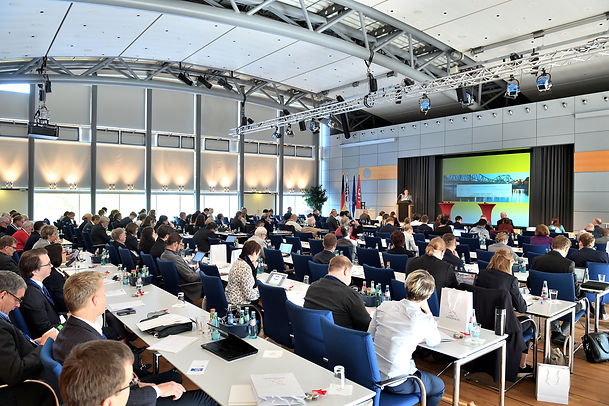Photos 1 & 3: Andreas Franke - panabild.de
Photo 2: Lars Godbolt, BSSSC
25th BSSSC Annual Conference comes to an end
From September 20-22 in Potsdam, Germany, the BSSSC invited stakeholders from all over the Baltic Sea Region to discuss the Cohesion Policy and the future of the Baltic Sea Region under the title “Cohesion = Togetherness”
In a crowded hall in Potsdam, about 200 representatives from all levels of governance from the whole Baltic Sea Region were present. The conference had a number of interesting speakers from the EU level (such as DG region and the European Commission), regional level (including representatives of the Council of the Baltic Sea States, EuroRegion Baltic, and Council of Peripheral Maritime Regions) national level, as well as municipal and, of course, sub-regional level. During the conference, there were also a number of representatives present from various NGOs related to policy areas such as culture, transport, innovation and the UN's sustainability goals.
Do we need cooperation?
Chairman of BSSSC and Mayor of Buskerud County, Roger Ryberg, opened the conference by recognizing the dramatic development in the Baltic Sea Region since the founding of the BSSSC in 1993. The wall has fallen and the clear distinction between East and West is not as clear as before. Today we have open borders and cooperation across borders in most areas. Some might take the current situation for granted. Do we then still need all these different platforms for cross-border cooperation in the Baltic Sea area, Roger Ryberg asked before giving his own opinion on the matter.
– I have never doubted that political arenas and networks like the BSSSC are necessary and make a difference. The global situation is becoming increasingly tense and we must therefore stand together to decide upon how we want the future of Europe to look like.
Peter Schenk, DG Regional and Urban Policy, European Commission, also encouraged to a strong cooperation because some problems are cross border in their own nature, such as environmental issues.
– And we are are still far from being in a good environmental state in the Baltic Sea Region, he said.
The future of the EU
These days, the EU has open consultations on the direction the EU and Europe are going to take. BSSSC has contributed and will continue to contribute significantly in the ongoing discussions through both written and oral consultation statements, said BSSSC Chairman Roger Ryberg.
– We will follow up on the discussions about Europe's future and continue our lobbying. We must be loud and clear to be heard - and together we are both stronger and more visible. Therefore, during this year's conference we have chosen to focus on cooperation. We are here to promote even more cross-border cooperation so that we can work even closer to give ourselves a more sustainable future. We need to cooperate more - not less.
Later in the conference Radomir Matczak, Department of Regional and Spatial Development Marshal Office of the Pomorskie Region, Poland, requested more action and implementation. He quoted Thomas Edison:
– “Vision without execution is hallucination”. In the Baltic Sea Region, we are very big visionaries. However, when it comes to implementation there is big room for improvement.
The future of EU cohesion funds
Markku Markkula, Vice-President Committee of the Regions, was there and underlined the success story of the EU cohesion policy.
– Cohesion is a pillar of European success stories. It allows all regions, including those lacking behind, to catch up and become pioneers. With the cohesion funds every city and every region can become a pioneer.
He, however, argued that these success stories must be better communicated to the citizens of the EU. He drew an example of the European railway network saying that without the EU we would not have come so far. Sharing these stories will make citizens see the good sides of the EU.
Markkula also gave some hints regarding how EU cohesion funds might look like after 2020, saying that in the future, EU funding will be much more directed to partnerships.
Ingrid Sculerud, Deputy Head of the Norwegian Delegation to EU in Brussels, suggested that EU funding should be come with a message.
– We have history of big wars, and this is why we started this corporation – to build bridges and cooperate instead of waging war on each other. This message should be brought with the funding. We have to remind ourselves of where we come from.
Youth strongly represented
In the days preceding the conference, from 18-20 September, the BSSSC had their yearly youth event. About 15 youths from several BSR countries were present, among them Russia, Norway, Poland, Germany and Belarus. The youths had prepared statements and prepared themselves for panel debates. There were presentations and panelists from the youth in two of the workshops (localizing Sustainable Development Goals, and Cultural Heritage) and they also presented their message to the BSSSC AC in a preliminary session at the end of Day 1. Amongst other things they want to reduce voting age to 16 and CO2 neutrality by 2030. Read more about the youth event preceding the conference here.
The BSSSC conference resolution
As usual during the BSSSC annual conference, the BSSSC conference resolution was presented. It contains a number of common positions from BSSSC regions on the future of the Baltic Sea area - from youth inclusion to transport corridors and, of course, the future of EU cohesion policy. Read the conference resolution here.
Roger Ryberg concluded the conference by summing up:
– The message to take home is that we must base our work on solidarity, tolerance and friendship. We need each other to succeed in forming a sustainable society!



